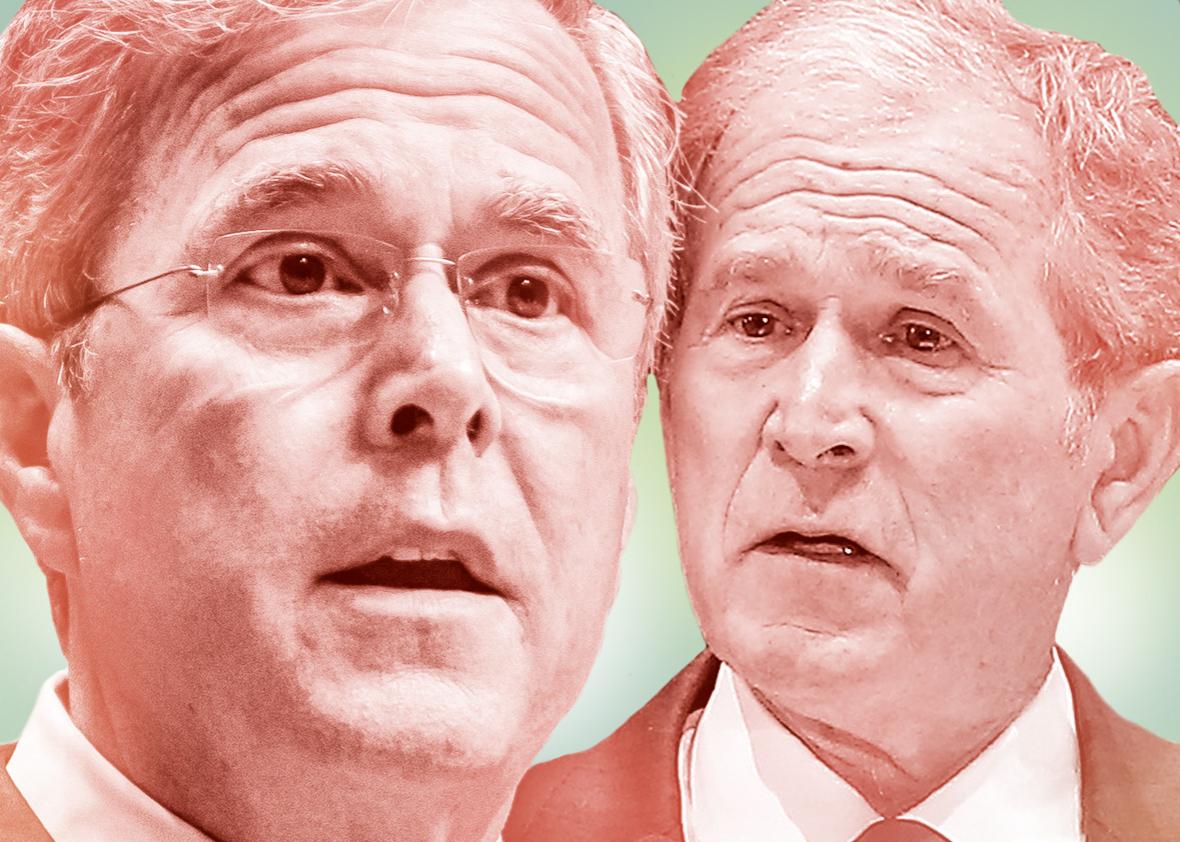Jeb Bush has gone from not wanting to be defined by his brother to using his brother’s legacy to define Donald Trump.
This weekend, Jeb Bush and Donald Trump slapped at each other over President George W. Bush’s legacy. “When you talk about George Bush, I mean, say what you want, the World Trade Center came down during his time,” said Trump. Jeb Bush responded by calling him “pathetic” on Twitter:
Trump returned the charge:
While everyone was getting out the microscopes to see just how small the debate could get, Bush raised the stakes. He countered that Trump’s claims about his brother were a sign that he lacked the judgment to be president. Bush’s campaign released a video with clown music and a string of Trump’s less confidence-inspiring statements about national security. It also made a fundraising appeal off of it. On a page with a picture of George W. Bush standing on the rubble of the World Trade Center, it reads: “President George W. Bush kept the country safe. Help us fight back against Donald Trump’s shameless attacks.”
This war of words is a test of Bush’s ability to take on the GOP front-runner, but it is also another way in which Trump is challenging the articles of faith in the Republican Party.
Bush has been itching for a fight recently. He’s poked at Sen. Marco Rubio’s lack of experience and said the Florida senator was being misleading about how much money he’s raised. Now Bush has taken on a harder target. His campaign advisers and aides cite pressure from donors who want to see Bush—the man once considered the front-runner—show some energy and toughness. If the GOP primary contest is going to come down to the establishment candidate versus the grassroots candidate, Bush needs to seize his place as Trump’s chief opponent.
These aren’t the first punches Bush has thrown at the real estate mogul. Bush has tried to pick fights before with Trump over the tone of his campaign and his immigration policies. He’s also charged him with being unserious before. Those jabs didn’t improve his standing in the polls. His position has only gotten worse.
Will this gambit now work? Bush was encouraged by the most recent debate. When Trump attacked George W. Bush at the Ronald Reagan Presidential Library, Bush responded: “As it relates to my brother, there’s one thing I know for sure. He kept us safe.” It received the biggest applause of the night. Among Republicans, George W. Bush’s favorability rating in a CNN poll this year was almost 90 percent. Among all voters in that poll, Bush’s approval ratings, which were in the 20s when he left office, had climbed to more than 50 percent.
In attacking W.’s legacy, Trump is actually aligning himself with an argument on the left, which has always scoffed at the claim that Bush kept America safe. Trump’s position on George W. Bush is even further to the left than Hillary Clinton. When I asked her if she agreed with Jeb Bush that his brother had kept the country safe, she said, “I think it’s a complicated question, because, of course, 9/11 happened. … And then I do give President Bush credit for trying to bring the country together around the threats that we did face. … So if you sort it all out, you know, it’s a mixed picture.”
It would seem that Trump is on the wrong side of an article of faith in Republican circles. Saying that Bush kept America safe, if nothing else, acts as a bulwark against criticism that the Iraq war was a disaster. But if there’s one thing that this race has taught us, it’s that Trump has repealed some of the core tenets in politics. It was once considered axiomatic, for example, that Republican candidates could never say anything negative about John McCain’s war heroism, or Mexicans, given the GOP’s need to court Hispanic voters. And a candidate certainly couldn’t say anything that might be described as sexist.
Jeb Bush is asking for a referendum on his brother in a public debate with a rival he has yet to find a way to beat. He seems to think he’s got a winning issue here, and Trump doesn’t back down—he outlined his argument in the Washington Post—so this might not disappear as quickly as Twitter slap fights do. If it does stick around, Bush may succeed in diminishing Trump and elevating himself. The debate over exactly how Trump can blame George W. Bush’s immigration policies for hijackers who came to America before his administration and how Trump would have behaved differently eight months into an administration may expose Trump as being full of bluster.
If it doesn’t work out that way, though, the damage may not be limited to Jeb Bush, who could emerge from the fracas looking like a candidate who only gets animated when it comes to defending his brother—a laudable quality, but also an exercise that bolts him ever closer to his brother, making it hard to prove that Jeb Bush is his own man.
It’s also possible that voters side with Trump in this debate as they have on previous ones. Or, the debate causes a re-evaluation of whether Bush did everything he could before 9/11. Peter Beinart makes the case in the Atlantic that he didn’t. The debate could also morph into one about the folly of the Iraq war. If that’s the case, Jeb will not only be diminished, but so will his brother’s legacy, which was improving before Jeb entered the race.
